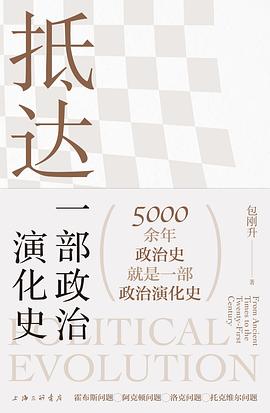WULOLIFE
《抵达》作者: 包刚升 出版社: 上海三联书店
《抵达》作者: 包刚升 出版社: 上海三联书店
Couldn't load pickup availability
Description
内容简介 · · · · · ·
◎内容简介
“人类政治从何而来?”
“人类政治在哪里?”
“人类政治向何处去?”
本书从演化论视角给出了回本书将不同政体与政治模式视为一个个“政治物种”,分析早期国家诞生的社会条件,从国家分化与演化的维度阐述城邦国家、一般国家、帝国的兴起与衰落,从政体分化与演化的维度讨论君主政体、封建政体、立宪政体、民主政体的差异与转换,以及人类不同群体在塑造有效国家与有效约束国家上的一系列差异如何形塑了不同时空的政治模式。
如果将人类政治演化比喻为一条大河,那么大河过去的基本流向后,或许就会更加明了今天我们所处的位置以及未来要抵达的方向。
--------------------------------------------------------------
◎作品看点
★ 复旦大学政治学系教授包刚升新作。
在十余年的时间里,作者包刚升教授一直专注于对并在复旦大学讲授政治学基础课与专业课,善于以条分缕析的形式讲述复杂的政治理论,以冷静客观的态度分析时事政治。其《政治学通识》一书以深入浅出的形式讲述政治学理论、关键议题,广受好评。在延续其分析风格的基础上,在本书中,作者将目光转向政治史长河,阐Note:
★ 四个时代、四大问题,呈现人类政治发展的基本脉络及其背后的逻辑。
为一部政治演化史,从四个时代即王权时代、封建时代、立宪时代、民主时代分析不同“物种”为了生存和发展展开的竞争,围绕国家问题、政治权力问题、有效约束国家问题、民主问题等。
★ 从动态视角看政治格局由稳定到变迁。
聚焦国家与政体的分化与演化,考察人类政治发展的共性与个性,具体包括:为什么不同群体的政治演化都产生了国家?为什么国家政治权力的分配与分享方式经历了一个从统治者到统治精英再到平民的不断下移过程?为什么中世纪的欧洲为封建主义政体支配而人类其他地方更多是中央集权政体。为什么自19世纪以来近现代民主首先在欧美、而后在全球范围内兴起?……
★ 聚焦不同时期代表性国家及地区,分析国家构建的成功与失败案例。
从国家与战争互相塑造角度分析缘何古代的秦国成为第一个“现代国家”而地理格局仅次于秦国的晋国却最终被瓜分;从政体角度分析古希腊与古罗马从繁荣到衰落;从战争模式创新角度分析蒙古帝国的崛起;从立宪政体建立与工业革命角度分析英国如何逐渐发展为全球领导者;从观念的力量与政治军事角度看美国如何实现独立、制宪与建国的过程……
★ 历史叙述与理论阐释相融合,个整体分析框架理解复杂多变的政治发展。
本书基于作者多年的研究,在对政治史代表性研究成果广泛涉猎的基础关注人类政治发展的关键细节与时刻,比如人类早期国家的兴起、从封建体制向立宪政体的转换、以此理解多变的政治发展。
★ 于政治发展中理解日常中的政治学概念,形成思考现实问题的脚手架.
对于国家、权力、权利、民主等这些我们经常在使用的政治学概念,作者将其放在从国家起源到21世纪今天的大背景下,带我们看此类以及代表性政治学学者的研掌握政治学关键观念,以此分析今天我们面对的现实问题。
★ Welcome
那么本书主要关注这条大河的主流或基本流向,解读政治演化史的基本逻辑。这无疑有利于我们形成政治学思维,进而以此思维看今天的世界与我们的位置,以及未来要抵达的方向。
